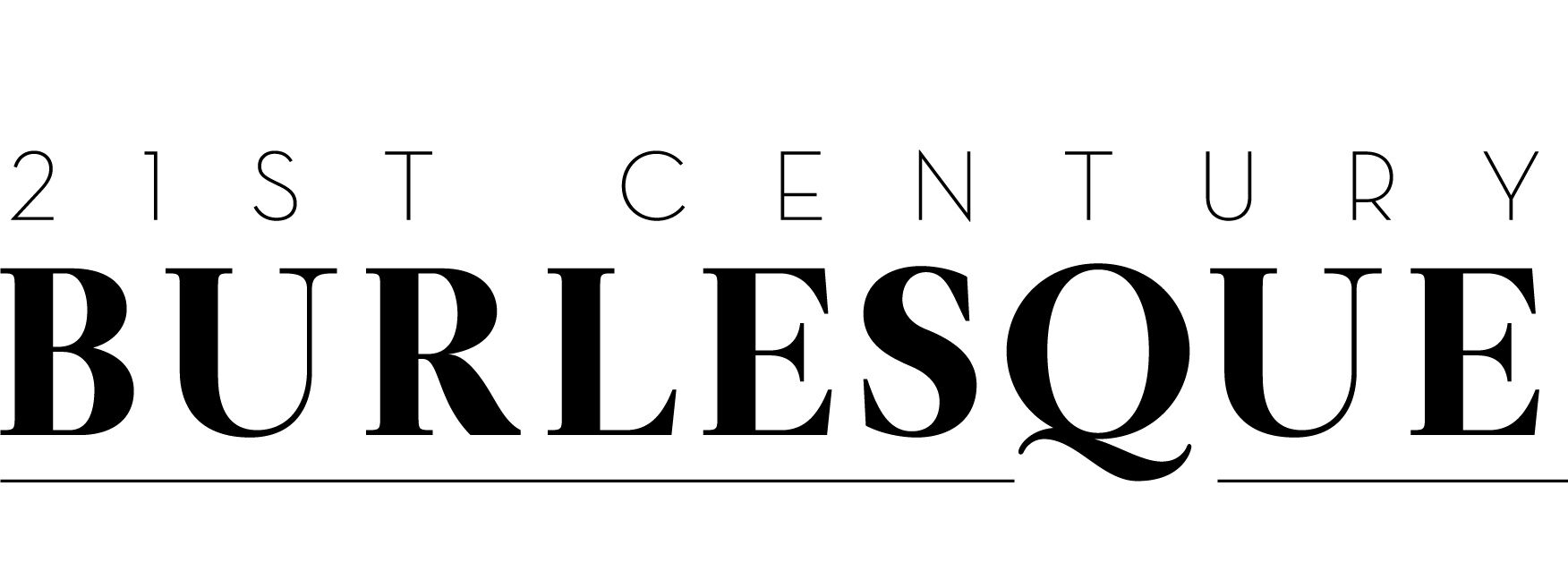After over a decade of conversations with Dirty Martini – burlesque icon, New York legend and all-round tease genius – there is always more to talk about. More memories from the birth of the modern revival. More illuminating insight. More self-deprecating authenticity. More and more passion for her art form with every passing year.
Read on for our most epic sit-down yet…
HMJ: I often think back to Teaseorama in 2005 when our worlds collided, before a ‘scene’ existed and all we had was a Yahoo group to argue in!
DM: Yes! When I was first starting out it was just me and five of my friends in New York – until Tease-O-Rama 2001, where I saw other performers and realised there were people from all over the country and the world performing and interested in this genre, way before there was a festival in every city. Can you imagine? That was kind of it!
The funny thing about that is that the media is still asking: What Is Burlesque? How can you still ask that question when there has been multiple films, documentaries, and television shows where Real Housewives go out and take burlesque classes. C’mon! Really? You still don’t know what it is, and you’re still asking to make sure people know that it’s not dirty stripping!
In the end, what journalists are really asking us to do is define it as the feminist, feel-good stripping that they’d like it to be. Which of course, it is! That and much more! I’ve been doing burlesque for twenty-some years, and that question is still the same and most people still don’t know who I am. That’s how hard it is to get seen.
I wish people would take more of a proactive role in their community off the internet. I think that is happening. A real conversation is painful and confrontational, but necessary.
I’m eager to talk about the Va Va Voom Room days in the early 2000s; Miss Astrid’s pivotal show starring Tigger!, World Famous *BOB* and Julie Atlas Muz, as well as you.
Miss Astrid – Kate Valentine – had just come back here to the east coast from LA, where she’d been working with the Velvet Hammer. It was a comfortable venue with really nice seating where everybody could sit and have a cocktail. People were drunk, but attentive.

And was it wall to wall striptease?
It was a true variety show. She made sure there were only three burlesque acts per show. There was Serge LeGainswhack, who did sixties Beatnik dance. We had Bradford Scobie who started out as a sad clown singing funny songs with a ukulele. Then there was Julie Atlas Muz, World Famous *BOB*, me, and a cast of rotating characters, like this street performing Carney called Mr Spoons, who would play the spoons. Who knows what happened to him? Just a whole host of odd variety acts, as well as many people who are stars of burlesque now who started in that venue or honed their skills there.
I’ve been doing burlesque for twenty-some years, and that question is still the same and most people still don’t know who I am. That’s how hard it is to get seen.
Have your lives evolved as you expected in the years since?
It’s so interesting. I could have never imagined that *BOB* would just stop doing burlesque to only host and decide to go back to school and work with seniors. I wouldn’t have guessed that Tigger! would ever move to New Jersey and buy a house with his husband. I did expect Julie to continue doing larger theatre productions and casting her crazy friends. I toured all over the world, which is pretty crazy, and started little burlesque scenes in all of these weird places – like the good enabler that I am! Dirty Stripperseed!

Did you have that kind of grand vision starting out, or did it just sort of happen, as things do?
As an abstract concept, absolutely, but I never thought it would be burlesque. At the time I started performing burlesque, I was still with a theatre company and a dance company. I started to do burlesque to do something until the next thing happened, and it turned out to be the thing! I never really imagined that!
It’s that John Lennon quote isn’t it: Life is what you’re busy making other plans.
Love John Lennon – hate that saying, but it’s true in this instance.
If we consider the burlesque scene of today, do you think anything has been lost, or needs to be confronted?
One glaring problem I see is that everyone knows what they’re doing. When we started out, we didn’t. A lot of us didn’t even know it was burlesque; we were just doing something crazy in a nightclub. Knowing that you’re a nerdlesque performer or a transgressive artist means you limit yourself as an artist completely, and sometimes you can’t get over yourself and try things that might evolve you as a human being and as a performer.
The other thing is money. I really love to hear the legends’ point of view on things. Their burlesque was a different world to ours. They had managers, they had supply and demand. Nowadays, I feel like there isn’t the same kind of supply and demand and there isn’t the same kind of purpose for burlesque that there used to be. This is both good and bad.

In what sense?
Well, I think it’s great that we are challenging stereotypes and norms, and subverting the male gaze, which I think is really positive in this particular time period. Everything that’s been going on politically is so important to bring into burlesque.
I think burlesque is burdened by so much arguing on Facebook within our own community; it makes people exhausted and takes their mojo. However, the reasons people are arguing are valid. People are fucking mad. They just can’t take it anymore and they want things to change. They should be mad, it’s a time for anger. It’s a time to ask yourself and others uncomfortable questions.
I wish people would take more of a proactive role in their community off the internet. I think that is happening. A real conversation is painful and confrontational, but necessary.
Knowing that you’re a nerdlesque performer or a transgressive artist means you limit yourself as an artist completely, and sometimes you can’t get over yourself and try things that might evolve you as a human being and as a performer.
What are your thoughts on the rise of ‘call out culture’ in our virtual global community?
The call out culture is both positive and negative. People need to be called out on their actions, myself included. I’m constantly learning. I actually love the idea that somebody thinks differently than I do and I learn from that and I change from that. Sadly when escalations happen, some of that wiggle room to allow change is squeezed out.
I see folks who grew up with social media blocking people who have different opinions. What if you can change someone’s outlook? Maybe they haven’t been exposed to your truth? That said, you definitely have to protect yourself when you’re vulnerable as many people in burlesque are, because we show ourselves in a way that others may not have the courage to do, and we need a bit of a buffer from trolls and the like.
I just wish that the conversations could be a little bit more empathetic. Generally it just snowballs into name calling and scandal. I don’t think it is productive for the continuation of this very marginalised counter culture form. We could all ask ourselves, ‘Am I being of service to myself and my community?’.
I think that people who are against liberal thinkers like us enjoy very much that we are fighting each other. It makes it easier for them to win. There are many people contributing to the world of burlesque and mentoring other newer performers and producers. I would like them to be the focus of the conversation. Our audiences are listening to us and our strong voices. Burlesque has been so positive and transformative for people; I’d like to see that continue.
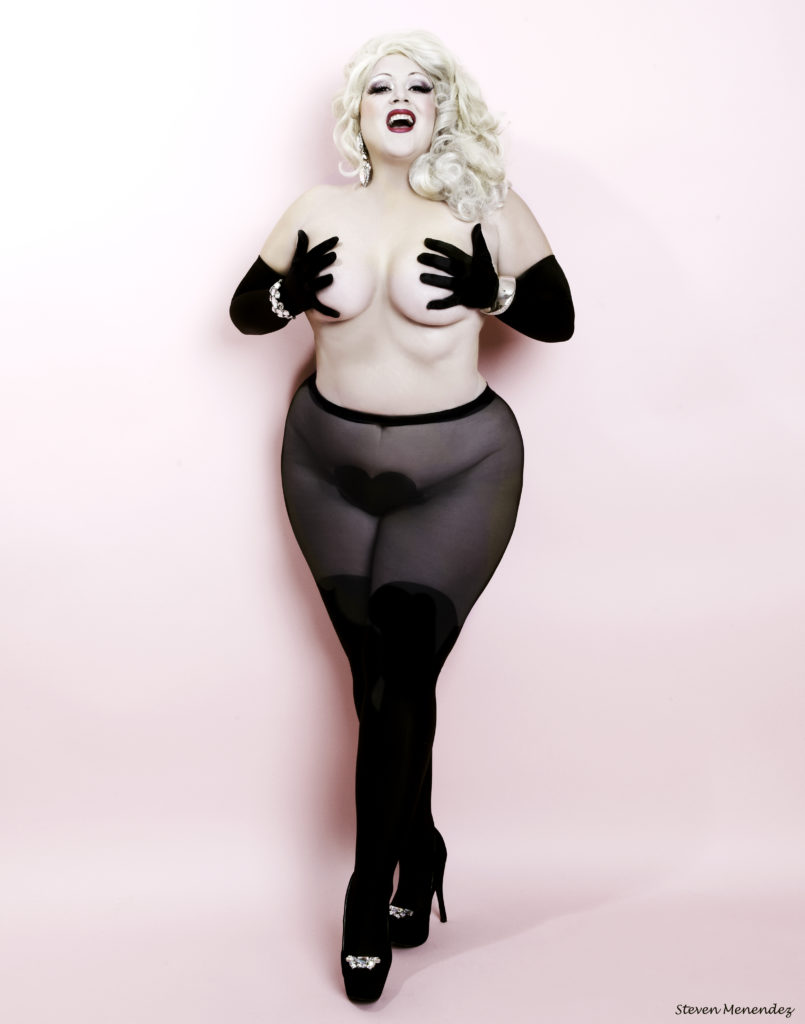
There’s a moment when, if they don’t take the defensive route, a person can say, ‘I’ve done the wrong thing here and I’m truly sorry.’ But often they aren’t allowed to apologise and admit fault; nothing is sufficient or acceptable…
Yes exactly. That is, as you say, if they didn’t go on the defensive, which for some people is impossible. Nobody wants to be the person who is an asshole, or doesn’t know anything. In general, people want to be right, and when they’re told they’re wrong, the first thing to do is to be defensive. I think there is little empathy for that. Even though the people who are calling out are probably that way too.
A good friend once told me some advice. Just because you get one answer today, doesn’t mean tomorrow the answer will be the same. It’s hard to forgive when you don’t think someone has learned a lesson. That’s the problem with such fights. People are learning all the time, some people take a little longer, yet others may never come around to your way of thinking.
I just wish that the conversations could be a little bit more empathetic. Generally it just snowballs into name calling and scandal. I don’t think it is productive for the continuation of this very marginalised counter culture form.
While there is a righteous crusade to give a platform to marginalised voices and minorities and call out inequality and inappropriate behaviour, I wonder if burlesque today is truly inclusive and accepting of all styles and extremes. I think of transgender performance artist Rose Wood as an example, who burlesques many aspects of modern culture, but has at times been rejected or overlooked by the burlesque community. Are there certain extremes that people don’t actually want to embrace and include?
I think there are a lot of gatekeepers and sometimes a small-town mentality. I live in a big town so it’s hard for me to understand why people are like that. Why are you telling anyone what they can and can’t do? Isn’t that exactly why we got into burlesque in the first place? We pride ourselves on being worldly, justice-driven people. It’s what brought us to burlesque in the first place, for the most part. I like to think of the world as a place where there is something for everyone. Where those worlds rub up against each other is when the sparks can fly.
Also, there are places for everything, which is good and there should be. You don’t want somebody coming to a show where they think they’re going to get Dita Von Teese and they get Rose Wood. It’s not proper advertising. Personally I like that dynamic; I would love to put on that show!
I always believed that burlesque is a place where you can take somebody who doesn’t quite know what they’re getting into and bring them on a journey. In an atmosphere where everyone is on board for fun and entertainment.

You’re known and worshipped far and wide as an icon of the American scene, famous in Europe as a member of Cabaret New Burlesque, the star of Matthieu Amalric’s Tournee, and now known to mainstream audiences through your tours with Dita Von Teese.
Have you established any kind of security or certainty, or do you enjoy a roller coaster existence and not knowing where you’re going to be next?
I think a lot of burlesque performers would love to hear that I have a townhouse, stocks and bonds, and I’m set up for life. The sad fact is that burlesque is still a marginal art form. Hey, I was on board for that when I started and I’m still on board with it now. I started out as a contemporary dancer! I never believed I’d make a million dollars.
My routine, just when it gets exciting and more steady, then changes altogether. I do not mind that at all. Of course I wish that I had more stability. I love it when the legends say, ‘Oh, you have to save your money’. I don’t live in a Louis Vuitton world. I don’t think most of us are getting money thrown at them, Perhaps some day that will change!
Are you conscious of the status you have, and do you ever feel the pressure of expectation when you’re conceiving new acts?
Sure, of course. I wasn’t really conscious of it for a long time until once when I came back to New York City after a long French tour. I performed some little gig, you know, changing in a broom closet, like we all do sometimes . Then the host started listing my accomplishments and I think it was a theme show and I was doing something really stupid. I had my head in my hands and I was shaking my head. ‘The muse to Karl Lagerfeld, Miss Exotic World and touring with Dita’, and I come out and do something I was just trying out – something that I wanted to experiment with.
In all seriousness, I am very, very lucky that people look at me in the way they do and are inspired by what I do. It’s really humbling. I’m really appreciative of people paying attention to my work and being affected by it. What more can an artist want?

What are your long term ambitions and goals at this stage?
My goal is always to be on the cover of Vogue, but we’ll see how that goes! I don’t have any lofty goals. I would really like to see burlesque become more respected in general, both the old burlesque and the new burlesque. It’s happening with drag and I don’t think we’re that far behind.
Do you think burlesque needs a Drag Race elevation of some kind to get the mainstream to really cotton on?
Yes, absolutely, I think it would help with visibility. It would also help with the constant accusation that it’s so amateurish. Well, yes, of course it’s amateurish. You have to start somewhere. In a way that can be part of the charm of it. That would not be the misconception if more people could see some of the quality performers that I see regularly. I think people would even delight in watching the progression of some of the careers that I’ve seen blossom.
If you’re just starting out and it’s been five years and you’re not seeing improvement, then you have to go back and wonder: are people not responding to me, and why?
What is the key to our growth and development?
I think a good acknowledgment of levels would be lovely. I know burlesque is about ballyhoo and you have to say that you’re the Queen of Everything because it’s a part of what we do, but by acknowledging that there are different levels, there can be more room for beginners, and of course, the most advanced.
If you’re just starting out and it’s been five years and you’re not seeing improvement, then you have to go back and wonder: are people not responding to me, and why?
Masterpieces don’t just happen. There’s a lot of trial and error. I think if people could just acknowledge they are on a journey and not pretend they are the Queen of Everything, that would be helpful.

Do you think we are just in a society that expects overnight success and instant gratification and people fall foul of that?
Dixie Evans told me once, ‘The problem with burlesque today is that everyone wants to be the queen but there are no foot soldiers’. I think we’ve always had that in our world. Everybody says that. Isn’t there a joke? I’m an overnight success, it only took me ten years!
I think it’s great to have all of your friends around you going, ‘Oh my god, you are so great! I love that number!’ It’s very important to have that kind of cheerleading. Performers should surround themselves with people who are positive about what they’re doing. I think, though, that it takes a really long time to define your own style.
I guess if you’ve been in burlesque for two years and you think you are ready for a spot in Dita’s show, there’s a disconnect there. It’s not that it couldn’t happen, it’s just very rare to not have incubation time. Even if you’re a natural burlesque performer and you come from another form like dance that gives you some advantages, there are still facets that need polishing. That can only come from working hard and performing a ton.
How do you see your place in burlesque long-term? Can you picture a day when you’re a legend, sat up there being interviewed, and the pioneers of the modern revival are suddenly the legends?
Well it’s only a matter of time I suppose, right? I talk to Jo Boobs about that a lot. When are we going to be the legends? And we’ll be up there going, ‘Wah Wah, thanks for the prize!’
The real answer is that our legends are called that for a reason. They have lived and they have learned and they have a lot to teach us. No one can replace our legends. They are all one of a kind. I’m so thrilled that we have created an entire culture around the women and men who are the unsung heroes of show business. I’ve had my turn on a panel or two talking about burlesque, but there is something really special about how we have connected with our naked revolutionaries of the past.
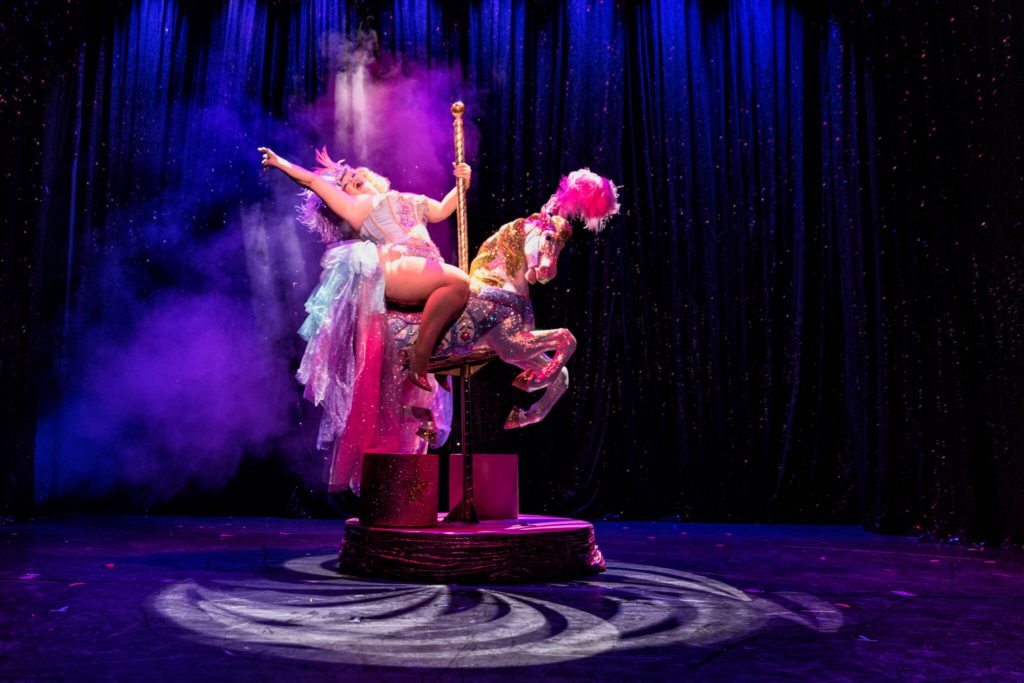
What’s it like being part of the Dita Von Teese tour machine?
It’s truly been interesting. She does get a different crowd than most burlesque shows I perform in, who are there to see burlesque. Dita’s shows are different because people are so into her; they just buy in to her whole glamour genre. Dita is smart enough to have people who counterpoint her in order to make it a more unique experience. She doesn’t need to do that.
I like to come out after all of the shows just to see who’s there from the burlesque world. Depending on the city, maybe 10% of the crowd is burlesque performers. Generally burlesque performers are so busy that it’s hard for them to get out and see anything else, and Dita’s ticket is expensive. Unless they are invited, they generally don’t come. There are also a lot of people who do come. I always notice who supports and I remember.
It’s always astounding to me that somebody will lift something completely from Dita and think that it’s not going to be noticed. Either by Dita or by people who work with her. It’s mind-boggling.
You don’t think it’s a slight or specific indifference from the scene?
Sometimes, yes. Especially from people who feel they should be in the same position as Dita and aren’t. I feel like there is a section that has a bit of jealousy going on. Hell, go ahead be jealous, but there’s a lot of problems that come with that kind of level too. Just be happy with what you are achieving.
It’s always astounding to me that somebody will lift something completely from Dita and think that it’s not going to be noticed. Either by Dita or by people who work with her. It’s mind-boggling. Every once in a while I’ll take a look through somebody’s Instagram posts and I’ll be like, ‘Oh look, there’s Dita’s cowboy costume, there’s Dita’s bird number, there’s Dita’s champagne glass…’ There are a fair number of people who have tried to copy what I do, but not in the same way that Dita gets it. Exact replicas. It’s really pretty amazing. there’s even somebody that says she’s a Dita Von Teese impersonator! I just don’t get why someone would want to do that!

In their strive for greatness, many performers aim for the Miss Exotic World title as the ultimate accolade. As a winner of that title, what does it actually represent in reality, then and now?
Neil Kendall and Bunny Bee and I are really trying to codify it and help Miss Exotic World to actually mean something and have actual duties involved. Expect to see some changes around the Miss Exotic World title.
We want it to reflect what people want it to be, which is sort of a community prize more than a just a prize that means you are best in show. So, any suggestions, come right to me! I’m taking all suggestions right now. Contrary to popular opinion, BHoF is all ears. The organisation really wants to hear people’s opinions and to hear how they can help change for the better.
I was crowned Miss Exotic World in the desert by Dixie Evans. I’m really glad that I experienced what I did in the desert, but it’s different now. I think we have an opportunity to really make it what we want it to be.
Contrary to popular opinion, BHoF is all ears. The organisation really wants to hear people’s opinions and to hear how they can help change for the better.
Are we talking about moving away from a pageant altogether and having it more as a bestowed title, like a Nobel Prize?
No. I think that people really do want it to be a pageant. It’s human nature to want a competition. I think there are ways we can make it to be what we want it to be, and have a competition at the same time. I think that’s what we’re working towards with the vetting process. Who gets to be in the show that night.
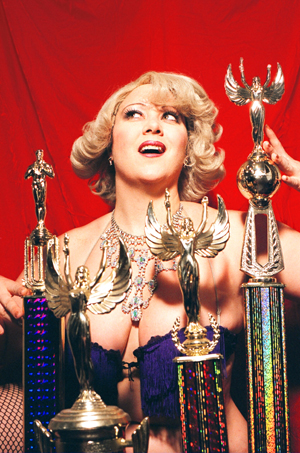
Do you imagine taking the pageantry format further and having a Q&A section where they articulate their ideas and beliefs?
Yes, that’s a part of what we’re working towards: getting it codified so everything is in place for Miss Exotic World to shine to her full capability. Less like Miss Universe and more like Woman of the Year!
What do you think of some of our recent queens? In years past, many of the iconic ‘big guns’ won the crown and then it became a sort of open field where it was completely up for grabs on the night.
I think that at a certain point professional performers have to choose whether to take work or go to BHoF. Perle Noire is a great example. She hasn’t won Miss Exotic World, but she is about as high up as you can get in the world of burlesque. She’s my queen! Not to say that any of the Miss Exotic Worlds aren’t deserving. Of course they are.
I would like to see that role evolve just as the reunion has. There just became a point where people thought, ‘Well, I tried and it didn’t work out, so I’m just going to be the queen that I know I am.’ That’s a healthy attitude, but we all want to celebrate greatness. I would encourage people to look at it as less of a horse race and more a celebration of everything we’ve done together to lift up this art form.

Do you think it’s a good thing that the field is open to a wider range of people who get a chance to shine on the night and take it home?
Of course. It’s evolving in a good way, I think. Part of it has always been trying to get the ‘Erochica Bamboo Factor’. She came to the desert from Japan and nobody knew who she was, but she fucking killed and took it, and we always want to keep that option open for somebody unknown to just come in, kill ’em dead and take that crown. But, I personally feel that Miss Exotic World has always represented something a bit broader than just a good performer.

I’m interested in the evolution of your self-image versus the external perception of you as a plus-size icon. How has your self-image and relationship with yourself evolved over the last couple of decades?
I was telling a story to a new burlesque performer about how I met Catherine D’Lish for the first time, which was at Tease-O-Rama 2001 at The Howlin Wolf in New Orleans. It was one of those hot New Orleans nights, and even hotter backstage and in the club. I got my period everywhere right before I went on, and I only had one pair of tights. I used to wear sheer to waist pantyhose every time I performed, but this time I got my period all over them and they were not going to be salvaged.
I ran into the bathroom and knocked on the door furiously. Catherine D’Lish answered the door. She was in there putting on her make-up. She was just so sweet and loving and couldn’t have been more supportive. When those tights got thrown into the garbage, I realised that I had to go onstage without any sort of safety net hiding my thighs. I don’t think she knew how much she helped me that night. Just to have someone that I admired be so supportive. It really helped me to get over a hurdle. Looking back on that is incredible.
Now I can’t even imagine my self-image at that time – to imagine that nobody wanted to see my thighs. It’s just so laughable right now, especially how I looked then as opposed to how I look now.
My body has changed quite a bit over the years. It’s really interesting to me to grow into my body with this new, ever evolving self-confidence. How sad for people who haven’t had the luxury of evolution. I see it in a lot of the performers and a lot of the people who come to Dita’s shows who have such a terrible self-image. It’s such a sad waste. I really hope that we can, as women, try to combat that. We may never stop having the body image conversation, but I’d like to feel that I’ve had a good impact on the world.
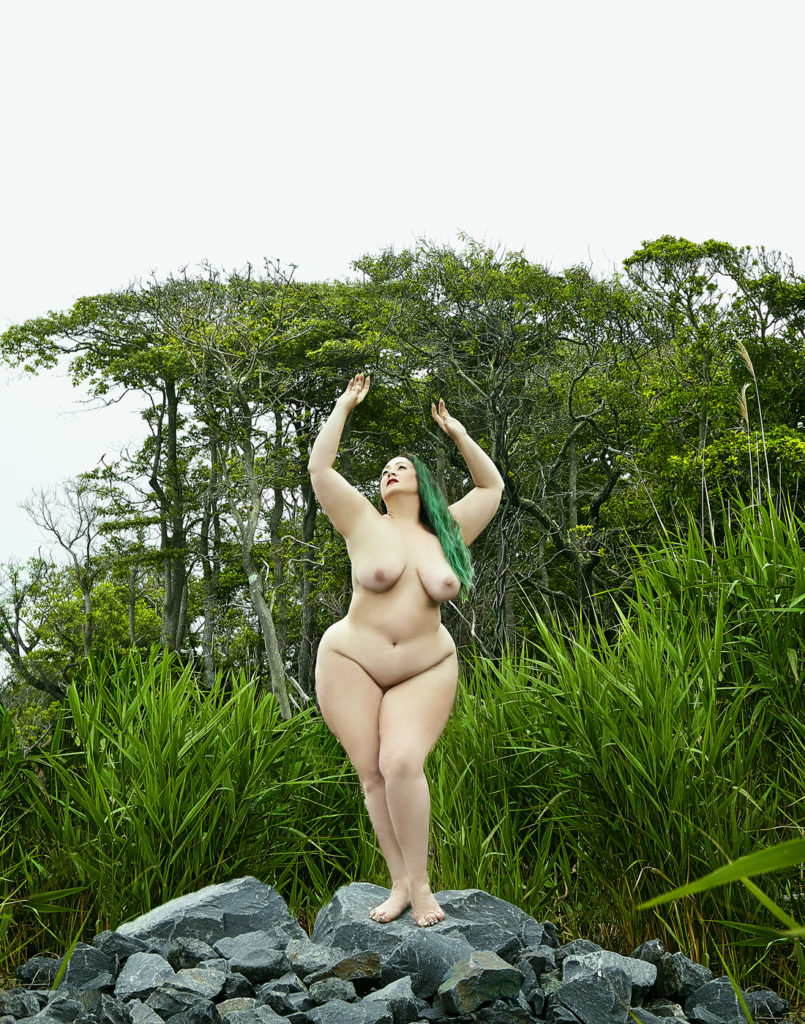
Can you describe where you’re at right now in terms of how you feel about your life and impart any key lessons you’ve learned?
I think getting to live with yourself as a flawed human being is really the best thing ever. You’re always going to hate something about yourself – that’s the nature of the world – but trying not to obsess and being able to let things go and not take yourself so seriously is really the key. Not putting yourself in a category, but busting out of the boundaries of who you are as a person.
From the beginning of my career I didn’t want to rely on the fact that I was plus-sized woman, although it is a factor in who I am as a performer and what I want to put out into the world. My onstage persona never acknowledges it. That’s a big frame of reference for me. The moment I say, ‘I am a plus-size woman in this world, and that’s my reason for being’ is really limiting and nothing I’ve ever wanted to go out and be. I just wanted to be who I am and hope that it inspires others to continue this important conversation.
My body has changed quite a bit over the years. It’s really interesting to me to grow into my body with this new, ever evolving self-confidence. How sad for people who haven’t had the luxury of evolution.
Who are you most grateful to, and what are your hopes for the future of burlesque?
My burlesque community in New York is the most astounding and amazing group of people I have ever had the pleasure to know. From people I don’t even know here and seeing their development, to people I’ve been working with since the beginning, like Tigger! and Julie and World Famous *BOB* – how amazing are these people? I would not want to live in a world without them.
I’m also grateful to Dita for making sure that her show is diverse and to all of the producers that work tirelessly to present burlesque even when they’re burned out.
I just hope people continue to perform burlesque and really enjoy the freedom of the form. That’s it. Go out there and be the queen or king of your scene. As much as we complain about it, burlesque is still the most innovative and accessible form of art. I really feel strongly that people should continue in its evolution and honour the legends who paved the way.
Dirty Martini interviewed by Holli Mae Johnson.
